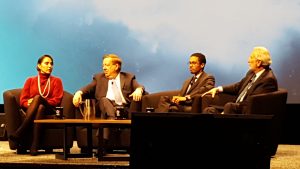December 12, 2017
Climate and Action: Events at Fall Meeting
Posted by Timia Crisp
Today’s post is part of a series written by student bloggers from the AGU Fall Meeting.
By: Troy Ferland, Pennsylvania State University
The Climate Science Special Report: “An Assessment of the Science Focusing on the United States” was a presentation of the fourth National Climate Assessment – an immense effort on the part of many scientists to provide a detailed analysis of how climate change is affecting the US. Though undeniably important, the report wasn’t sharing any new information with the scientists in the room: 15 of the past 16 years have been the warmest on record, sea level is rising, and extreme weather events are increasing in both intensity and frequency, et cetera, ad infinitum.
The fact that the report wasn’t surprising to us scientists truly comes as no surprise – the data is there. However, we as scientists want to feel like our work matters; outside of the broader impacts sections in our proposals, outside of the implications sections in our publications, we want to see it. The report lasted its allotted hour, and the ensuing time set aside for panel discussion and audience questions was filled with one question on all our minds, voiced by an audience member who asked, “What’s the happy ending to this story? What impact are you hoping this will have, and how do we go forward?”.
The panel’s response makes intuitive sense to us – that this report will be a resource for the citizenry of our great nation, that eventually fact and reason, if provided, will work its way into our national political discourse, with climate action logically following. The science keeps getting better, data sets more complete. However, in spite of the information we have, the U.S. is the only country not signed on to the Paris Climate Accord, leaving many of us feeling frustrated.
Now bear with me. I’m not writing this blog with the intention of being depressing, rather the opposite. To all who attended the Climate Science Special Report (or other talks like it), I sincerely hope you, like me, jogged over there from the Special Plenary: “Why We Are Still In”. It was, for those in attendance, a good slice of optimistic hope that many of us have been craving.
“This is not your grandfather’s AGU!” proclaimed Dr. Don Boesch, panel moderator and former president of the University of Maryland Center for Environmental Science, following a special performance of “Make It Hot”, a climate-infused rap by Baba Brinkman. Instead of focusing on the issues with which we’re all well-acquainted, Boesch roused the crowd with the lesser-touted facts: approximately 1770 business investors, 250 cities and counties (New Orleans included), 9 states, and nearly 340 colleges and universities have all signed on to the We Are Still In movement – a response by city, state, and local governments, alongside universities and the private sector to support the global community in the effort of combatting climate change amidst the US’s decision to recuse itself from the Paris Climate Accord.
Joining Boesch on the panel was Mayor James Brainard from Carmel, Indiana, Tanya García, Secretary of the Environment from Mexico City, and Deputy Mayor of New Orleans, Jeff Hebert. Brainard, a Republican representing a Republican-dominated district, proudly shared his district’s goal of attaining net zero carbon emissions by 2040. He credited Carmel’s transition from your typical, sprawling suburbia to a tighter city employing mix-use urban planning – “designs for people, not automobiles” – that will hopefully eliminate exorbitant automobile usage. García and Hebert shared their fellow panelist’s sentiment, describing the steps being taken at their respective legislative levels.
Maybe it was because the panelists weren’t scientists, but elected officials and legislators, but the effect these panelists had on the scientists in the room was substantial. Applause was abundant, and for the first time in what seems like a while, many of us were reminded that what we do matters. That some people in elected positions, the people who hold the fate of the many in their hands, are listening. Not only that, they want more – more predictive power over the regional and local impacts of climate change so they can communicate risks, and start drafting solutions. And I think that’s a message some of us desperately need to hear.
So keep doing good work, keep pressing forward. Call your representatives, go out and meet them, even! As Mayor Brainard said, “Everybody sees their city from their back porch” – if we continue to not only do the science, but to be active in the community, and make climate change real for the public, then the positive changes will come.


